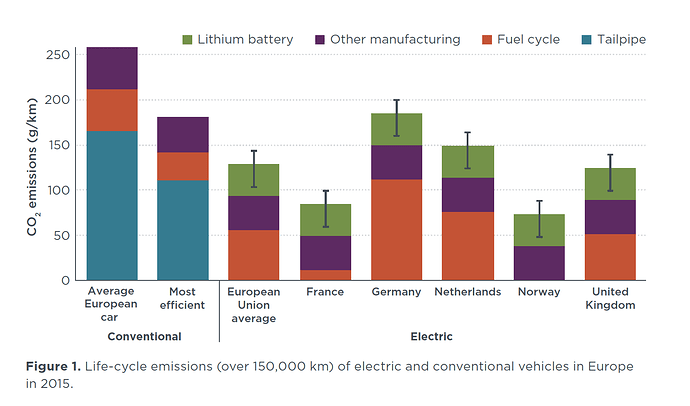How “ecological” the electric or hybrid cars really are, if the power to run them still comes from coal? Does it make any sense to invest in hybrid (significantly more expensive) car, when we live in a country with the majority of energy coming from coal mines?
Electric car always offers a great option for reducing local emissions. While combustion engine car combusts the gasoline or diesel locally and emits its emissions to local neighborhoods, the electricity production powering electric cars is often done further away from urban centers.
When considering the total overall emissions, the way the electricity is made really makes a difference. This is seen in the figure below, which presents the lifecycle emissions of an electric car compared to a conventional car. The bars show the different contributions to the lifecycle emissions: battery manufacturing, other manufacturing of the car, fuel, and tailpipe emissions. The ‘fuel cycle’ corresponds the electricity made to power the electric car (in the case of conventional car this corresponds to the emissions from the production of the gasoline or diesel). Tailpipe emissions are the CO2 emissions from the car exhaust pipe - thus this emission source is missing from the electric car bars. From the figure you can see that an electric car in Germany, which has a high CO2-intensity of the electricity production, is close to the most efficient gasoline car. However, in France and Norway the electric car is much more ecological, as the electricity production is almost or fully CO2-free (in France mostly nuclear, in Norway hydropower).
But there is still another issue. The batteries currently used in electric cars need raw materials (cobalt and nickel in particular) that are not very abundant. Thus, without improving the applied technology, the current electric cars are not really a global solution. We will simply run out of the critical materials. Thus the transition to electric cars should not be rushed, as some time is needed to develop better materials solutions that will not cause global shortages if masses are starting to change their cars to electric vehicles. However, the work is on its way, here is an example about an alternative battery technology promoted in a news article in The Guardian.
This material shortage issue is also one reason why electric cars are so expensive. The other reason is the small overall volumes in their production. So if I would give a short answer to your original question: it really depends on the country you live in and how the electricity used by the car is produced.
Figure source: https://theicct.org/publications/EV-battery-manufacturing-emissions
References:
Dale Hall and Nic Lutsey: Effects of battery manufacturing on electric vehicle life-cycle greenhouse gas emissions, International Council on Clean Transportation, 2018.
https://theicct.org/publications/EV-battery-manufacturing-emissions
Carbon Brief: Factcheck: How electric vehicles help to tackle climate change
https://www.carbonbrief.org/factcheck-how-electric-vehicles-help-to-tackle-climate-change


